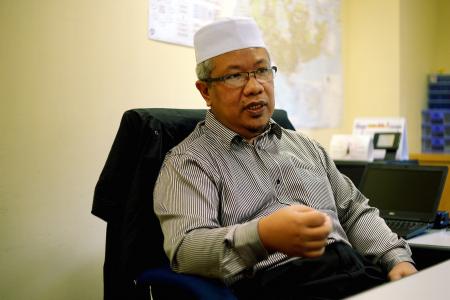I was afraid of dying in my sleep, says man who suffered sleep disorder
Man suffers sleep disorder for years
For three years, he barely slept at night and when he did, he choked.
Mr Sarifudin Sapari, 50, also suffered from tension headache in the morning and breathing problems at night.
At work, the deputy head of National Environment Agency's North West regional office constantly felt lethargic.
Once, he was working on a document for work and had his finger on the delete button when he dozed off, wiping out all his work of the past two hours.
In June 2013, he went to see his family doctor and was diagnosed with Obstructive Sleep Apnoea (OSA).
OSA is a sleep disorder where the oxygen supply to the body is cut off and the rise of carbon dioxide eventually awakens the patient by him gasping or snoring.
Mr Sarifudin, a father of six, said: "My wife used to complain about my loud snoring.
"My son who occasionally sleeps with us also told me he had to sleep with a pillows over his ears."
Mr Sarifudin, who was taking a diploma in Islamic Studies in 2012, also recalled how he had difficulty remembering things.
(He is now taking a degree in Islamic Studies with Jamiyah Singapore and Islamic University College of Melaka (KUIM).
"My memory became poor. So when I was at work, I tried to revisit certain issues by talking about it often with my team. When I was in school, I created study aids like mind maps to help me revise," he said.
After the diagnosis, he was referred to Changi General Hospital, where he was put through a sleep test. The test confirmed that he stopped breathing about 80 times throughout the night.
FEAR
Said Mr Sarifudin: "I feared that if it got worse, I would not be able to wake up when I cannot breathe during the night and that scared me the most, dying in my sleep.
"Not so much for myself, but for my wife and kids because I'm the sole breadwinner of my family."
His doctor told him that one of the main factors of OSA was his weight, which was about 95kg.
He also suggested that Mr Sarifudin go for a tonsillectomy, a tonsil removal surgery, to decrease the amount of blockage in his airway.
Said Mr Sarifudin: "I have a very low threshold of pain so I was considering if the surgery was really necessary, but when I realised that it would significantly improve my daily activities, I decided to go along with it."
He did that in November 2013 and it was a success. He was transferred to the Intensive Care Unit for a day to make sure his breathing was stable.
"After the surgery, I felt like I was standing on a beach and I could feel the air rushing in. I will never forget how good it felt," said Mr Sarifudin
After the surgery, he lost 10kg in a week and was sent to a dietitian for advice on his food intake.
His wife, whom he jokingly calls his nutritionist, also helped by constantly reminding him to cut down on things he used to indulge in.
"I'm a huge fan of pastries and chocolate. Now, I eat it only once in a while. I try to reduce my rice intake and cut down on milk and sugar as well," said Mr Sarifudin.
A month later, he went through a post-surgery sleep test and the number of times he woke up from sleep that night was significantly reduced to fewer than 15.
He urged others who faced the same problem to seek medical treatment immediately.
"I used to dismiss sleep disorder as a minor condition, but my life has significantly changed for the better after I had it treated," said Mr Sarifudin, adding that he is not completely cured, but his condition is much improved.
He also bought a treadmill to help him lose weight, as he is almost back at his peak of 95kg.
Said Mr Sarifudin: "Losing weight is challenging, but nothing feels better than sleeping through the night without having to wake up every few minutes."
I feared that if it got worse, I would not be able to wake up when I cannot breathe during the night and that scared me the most, dying in my sleep.
- Mr Sarifudin Sapari, who suffers from sleep apnoea
WHAT IS SLEEP APNOEA?
Obstructive Sleep Apnoea (OSA) is a common sleep disorder that often goes undiagnosed, said a consultant ENT surgeon at Mount Elizabeth Medical Centre, Dr Gerard Chee.
"Most people who have OSA are not aware of it because it only occurs during sleep. A family member or bed partner will be the first to notice signs like loud snoring or obstruction in breathing," said Dr Chee.
He explained that OSA is more common in people who are overweight because the excess weight thickens the neck tissue and narrows the airway, causing breathing pauses during sleep.
Amendela ENT Head and Neck Centre's Senior Consultant and surgeon, Dr Samuel Yeak, added that symptoms include loud snoring, excessive daytime sleepiness and tension headaches.
"Depending on the severity, OSA can increase the risk of chronic illnesses such as high blood pressure, heart attack and stroke in the long run," said Dr Yeak.
A family member or bed partner will be the first to notice signs like loud snoring or obstruction in breathing.
- Dr Gerard Chee
Get The New Paper on your phone with the free TNP app. Download from the Apple App Store or Google Play Store now



